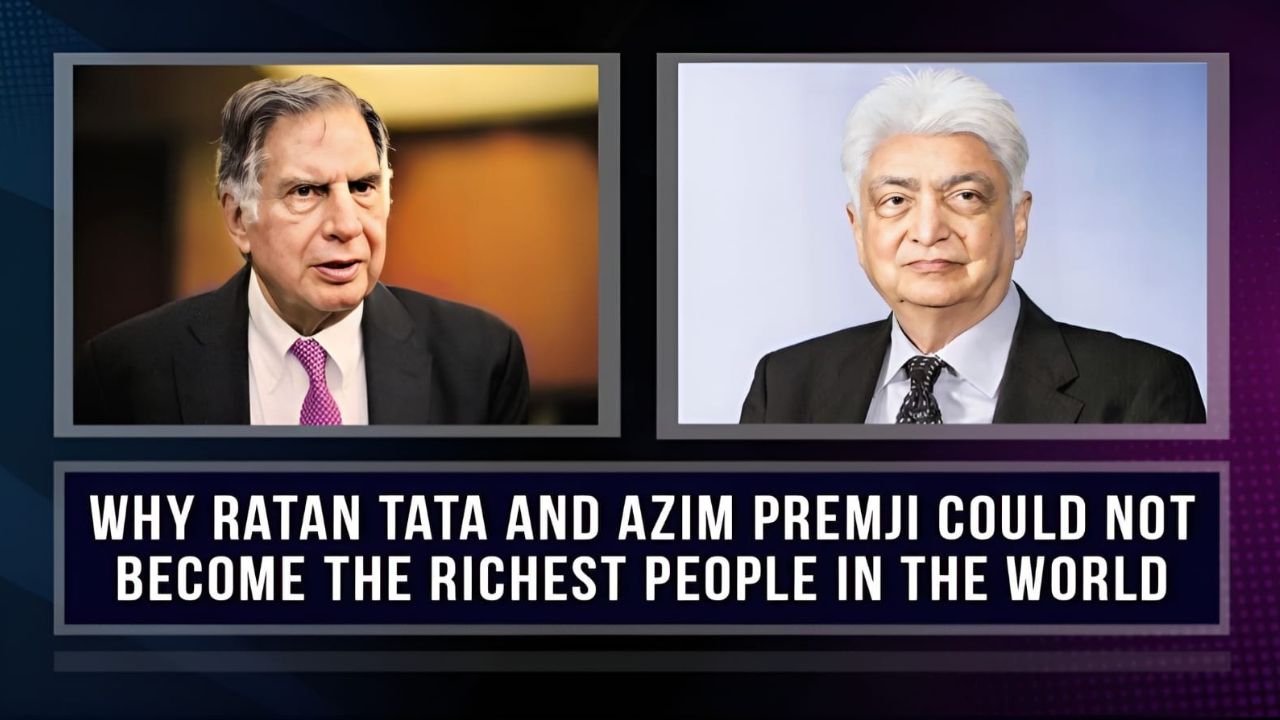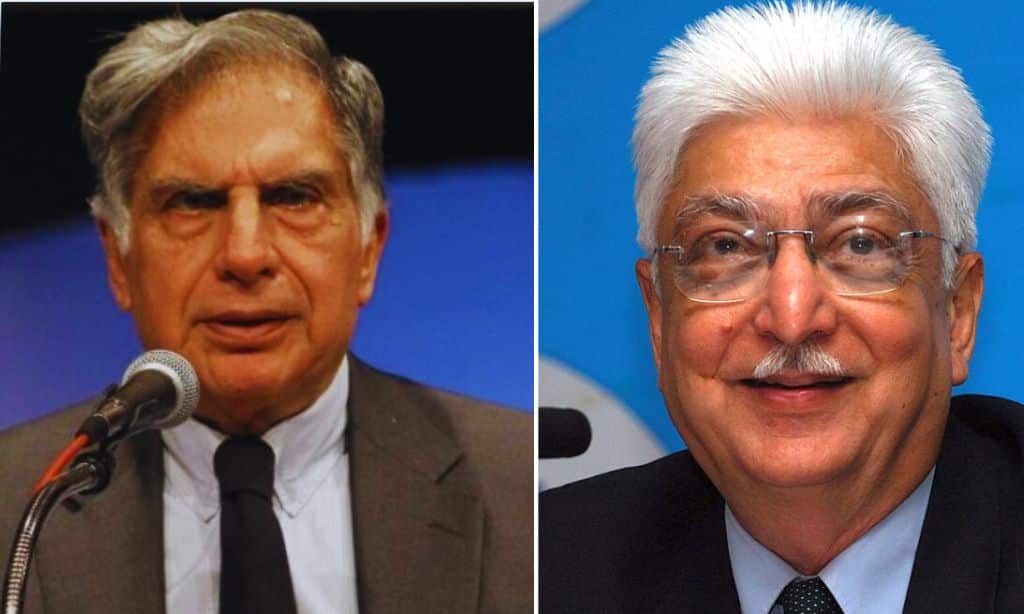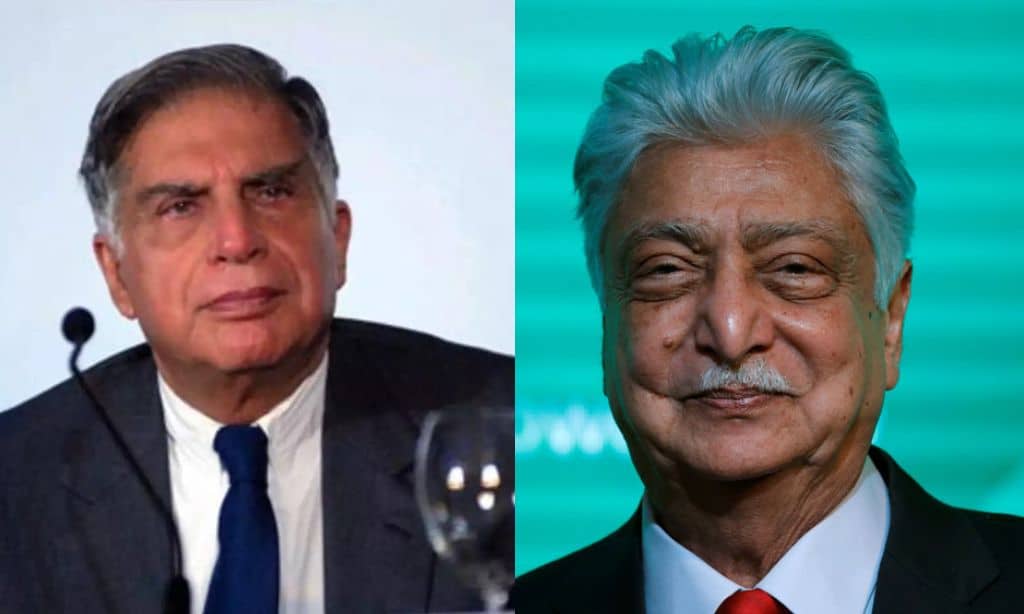Ratan Tata and Azim Premji might be two of India’s most respected business leaders, but they are far from being the world’s wealthiest people. Despite their immense wealth, Mukesh Ambani is the most affluent in India, with his vast majority shares in Reliance Industries.
In this blog post, we’ll discuss why Ratan Tata and Azim Premji could not become the richest people in the world. We will look at what differentiates them from other billionaires around the globe, including a comparison between the success stories of different companies and industries within India.
Further, we’ll address government policies and societal values influencing decision-making. So, if you’ve ever wanted to understand why these two tycoons haven’t been able to reach number one among the global billionaires list – then read on!
Content Highlights
- Ratan Tata and Azim Premji couldn’t become the world’s wealthiest people as their limited scale and size of businesses didn’t match up to large global companies like Microsoft or Tesla.
- The ownership structure of their respective companies was complex, meaning distributions of wealth were low, resulting in little personal financial gain for both men, who had also devoted considerable time and resources towards philanthropy instead of concentrating on personal enrichment.
- Economic trends have played a key role in limiting these two billionaires from becoming ‘richest’ person; notable occurrences like progressive tax reforms that negatively affected overall business growth meant they could not reach heights attained by counterparts from other sectors, such as tech billionaires with access to early-stage funding from venture capitalists allowing them exponential expansion at higher paces than ordinarily possible.
- Stiff competition in industries belonging to Ratan Tata and Azim Premji further aggravated fortunes by reducing pricing power, reducing returns on investments, and impeding business expansions, which can compare favorably alongside fellow tycoons who achieved successes within different sectors around the globe.
Reasons Ratan Tata and Azim Premji Couldn’t Become the Richest People in the World
They both had limited scale and size of their businesses, a focus on philanthropy and social responsibility, investments in diverse sectors, and additional economic and political factors.
Scale and size of their businesses
Ratan Tata’s business empire, known as the Tata Group, was vast and stretched across numerous industries. However, compared to global giants like Microsoft and Tesla, which had exponentially grown to become some of the world’s most valuable companies, the scale and size of his businesses did not reach such exemplary heights.
Similarly, Azim Premji’s Wipro primarily focused on IT services and was a multi-billion dollar enterprise. Still, its net worth of $15.75 billion couldn’t match up to billionaires like Bill Gates in other sectors with a larger magnitude of wealth.
It is because success in becoming one of the wealthiest people in the world is partly dependent on having businesses big enough to generate outsized profits from their investments, with larger firms offering more significant opportunities for growth and yield than smaller ones.
The ownership structure of their companies
The ownership structures of the companies owned by Ratan Tata and Azim Premji are complex. In the case of Ratan Tata, his company, Tata Group, has most of its shares held by charitable trusts such as Tata Sons, Sir Dorabji Trust, and several other affiliated trusts.
Similarly, Azim Premji’s company, Wipro, is also partially owned by charitable organizations. It limits distributions of wealth to shareholders and, as a result, leads to minimal personal financial gain for both businessmen.
Both Ratan Tata and Azim Premji have also taken significant steps towards philanthropy instead of focusing on their growth in terms of wealth accumulation – this philosophy reinforces their commitment towards social welfare rather than personal riches.
Focus on philanthropy and social responsibility
Ratan Tata and Azim Premji are two of India’s most successful billionaires who have chosen to focus a great deal of their time, energy, and resources on philanthropy and social responsibility.
Both men have made substantial financial contributions to tackling poverty alleviation in India with donations from their foundations. As well as investing heavily in the education sector, both entrepreneurs have actively supported healthcare initiatives through organizations such as The Bill & Melinda Gates Foundation.
They also promote corporate social responsibility by encouraging other businesses to do more for those less privileged than them. Tata Group supports female empowerment programs across the globe, while Wipro has invested significantly in sustainable community projects around India that reduce environmental pollution.
Through such endeavors, Ratan Tata and Azim Premji aim to make a lasting difference in reducing global inequality by providing some much-needed support for communities genuinely struggling with the effects of poverty or lack of access to healthcare and educational services, which many take for granted daily.
Investments in diverse sectors
Ratan Tata and Azim Premji have both made significant investments in a wide variety of industries, ranging from automotive to pharmaceuticals. Their release of capital into different sectors has allowed them to diversify their wealth portfolio and accumulate wealth through successful ventures.
By investing in multiple startups at the same time, they can spread financial risks among varied sectors while still potentially benefiting from company successes. Additionally, by investing in new companies with personal cash infusions or stakes, these billionaires lend the startup an enhanced credibility, which is beneficial for survival and growth.
As their investments gain more traction across a vast array of businesses, this will further enhance the probability that they will rank higher on wealth accomplishment lists and help amass more fabulous fortunes over time within their respective countries’ economic environments.
Economic and political factors
Significant wealth accumulation requires excellent planning, an eye on global economic and political trends, and motivated focus and concentration. Ratan Tata and Azim Premji couldn’t become the wealthiest people in the world for a variety of reasons, including external forces such as the scale and size of their businesses, ownership structure of companies, focus on philanthropy rather than personal gain, investments in diverse sectors and structured plans in place to spread wealth more equitably across society.
Political policies like taxation also played an essential role in determining the success or failure of these two billionaires’ ventures; notably, progressive tax reforms have often been detrimental to business growth by adding additional costs to operations.
Furthermore, economic downturns routinely cause setbacks that reduce financial gains from particular industries or regions, while inflation strains family resources over generations spanning multiple decades.
Comparison to other billionaires
[Video Credits @Trend Max]
Examining other billionaires in different industries reveals significant differences in their success factors and global rankings.
The success of other billionaires in different industries
Other billionaires in India have achieved remarkable success in various sectors. For example, Mukesh Ambani has built India’s most prominent business empire interested in energy, real estate, digital services, and more.
He owns the most expensive personal residence on earth and is currently the wealthiest Indian, with a net worth of US$ 89.4 billion as of October 2023. Similarly, Azim Premji controls one of India’s top software companies, Wipro. He has consistently been one of India’s leading philanthropists for his commitment to education and healthcare initiatives.
However, these successes pale in comparison to those attained by global technology giants such as Jeff Bezos or Mark Zuckerberg, who had access to early-stage funding from venture capitalists, which allowed them to rapidly grow their businesses at a much higher pace than individuals operating within the same industry can achieve; this enabled them to acquire larger market capitalizations leading up them ranking higher on lucrative global wealth rankings worldwide.
Global economic trends
In the past two decades, several global economic trends have significantly impacted the ability of Ratan Tata and Azim Premji to become the wealthiest people in the world. According to research by Forbes, there has been a shift from traditional industries such as manufacturing and agriculture towards digital services and tech businesses dominated by billionaires such as Bezos, Zuckerberg, Gates, and Ma.
This shift in wealth distribution is one of the major contributors to why Ratan Tata’s fortune is worth $1 billion compared to other Indian business leaders like Lakshmi Mittal, whose fortune stands at $17.8 billion.
Furthermore, India’s heavy reliance on its emerging tech sector also contributed directly to Premji failing to take the top spot among India’s rich list despite his IT products being widely popular globally. Therefore, it can be concluded that these new economic trends have played a key role in limiting their chances of becoming President Moneybags.
Competition in their respective sectors
Both Ratan Tata and Azim Premji faced stiff competition in their respective industries, limiting their ability to become the world’s wealthiest individuals. In particular, Ratan Tata had to compete against global players like Hyundai Motors and Volkswagen in his foray into car manufacturing.
Similarly, Azim Premji has contended with multinational IT service providers such as IBM and Accenture concerning providing services from India. Competition severely limits how much one can earn due to reduced pricing power and cannibalized investment returns, leading to more subdued business growth for both billionaires.
Furthermore, other billionaire tycoons have been successful in various sectors, exposing them to significant income streams, which enabled them to amass more incredible wealth than even Ratan Tata and Azim Premji despite the similar scale of businesses under their charge. In addition, you can also read an article on- Top 10 Richest Indian Man in 2023
Impact of government policies
Government policies can significantly influence the possibility of individuals becoming billionaires, with taxation systems and regulatory environments impacting investment decisions.
Taxation policies
Government taxation policies have significantly impacted the wealth accumulation of Ratan Tata and Azim Premji. These policies have limited the ability to pursue entrepreneurship and create wealth in India.
Government regulations, taxes, and other fiscal policies have encouraged black money generation, leading to an economic decline in India’s economy. Stock prices have been falling since 2008, leading to fewer opportunities for investment and financial growth.
Furthermore, corruption scandals in all parts of India’s political scene often cause anxiety among investors- rendering it harder for billionaires like Ratan Tata or Azim Premji to accumulate large amounts of money without causing trouble with authorities.
Regulatory environment
Government regulations can significantly impact individuals’ ability to generate and accumulate wealth. In India, government policies have long restricted the growth of businesses in many sectors due to complex laws, high taxes, and bureaucratic hurdles.
It may explain why Ratan Tata and Azim Premji could not become the wealthiest people in the world despite their vast empires. The economic policies of the Indian government limited their opportunities for financial gains, while other billionaires had more favorable conditions around them to build on their wealth.
Complicating factors like fluctuating stock prices, corruption scandals, and other such issues also hampered the potential growth of these tycoons’ investments.
Challenges in doing business in India
The business climate in India is challenging due to numerous economic, financial and policy restrictions. Government policies directly impact businesses through taxation, regulations, and how companies operate.
It can lead to increased costs and bureaucratic red tape, which can be difficult for entrepreneurs like Ratan Tata and Azim Premji to navigate. In addition, the economic downturn has led to falling stock prices, hindering wealth accumulation, while corruption scandals add further stress.
Aging billionaires in India also present a problem as resources tend to move away from them without proper succession planning or reinvestment into different sectors of the economy.
Cultural and societal factors
While wealth redistribution plays an essential role in the Indian culture, philanthropy and social impact are vital values that have held Ratan Tata and Azim Premji back from reaching the top of the billionaire rankings.
Emphasis on wealth redistribution
India has an immense wealth gap and one of the most extreme forms of income inequality globally. This socioeconomic imbalance associated with India has resulted in an emphasis on wealth redistribution to bridge gaps between those who have more and those who have less.
Such redistributive policies, including taxation, government welfare schemes, and charitable donations, are inspired by Indian cultural values that prioritize reducing poverty, improving overall social welfare, and practices such as altruism and generosity among citizens.
In this way of thinking, someone cannot achieve success solely by accumulating personal financial resources. Still, it should also reflect passions for philanthropy and making an impact on society or their communities at large.
Importance of social impact and welfare
Ratan Tata and Azim Premji’s focus on social impact and philanthropy is as integral to their business success as other factors. From a cultural standpoint, both have embraced traditional Indian values, which stress social responsibility, corporate citizenship, and redistribution of wealth for the greater good.
As strong advocates of giving back to society through charitable causes, these business magnates prioritize long-term sustainability over short-term profits while at the same time striving to make an impact in various sectors such as healthcare access, education, and poverty alleviation.
Despite challenges like India’s stigma-ridden attitudes towards mental health issues that prevent better delivery of medical care in rural areas or limited economic opportunities available to people below the poverty line, both Tata & Premji are setting an example by focusing on making a difference rather than accumulating personal wealth.
Through initiatives like creating tech schools with free admission or partnering with The United Nations Children’s Fund (UNICEF), they are aiming not only for self-sufficiency but also impacting whole generations positively–providing them with means to attain college degrees that can open doors later online.
Personal choices and values
Ratan Tata and Azim Premji exemplify the priority of long-term sustainability over short-term profits, focusing on legacy and reputation and always giving back to society.
Prioritizing long-term sustainability over short-term profits
has been a critical factor in the success of Ratan Tata and Azim Premji. Their respect for ethical values and prioritization of long-term viability instead of immediate gains have enabled them to achieve their business goals, build solid corporate reputations, and make meaningful social contributions.
This approach has led both entrepreneurs to invest in multiple startups early on, including creating Jio Platforms with various high-growth potential industries that have grown significantly since then.
Meanwhile, after carefully considering their morals, they removed all investments from sectors such as tobacco companies that could potentially harm society or the environment.
Moreover, both inspired many around them by consistently stressing how vital sustainability is for success in business while continuing to pursue philanthropic activities to give back to society through education initiatives and healthcare technology innovations. Additionally, you can also read about- Most Influential CEOs of India
Focusing on legacy and reputation
Ratan Tata and Azim Premji have maintained exemplary standards of generosity, humility, honor, and integrity while sustaining their business empires. While other billionaires focus on acquiring wealth, we can’t overlook the impactful legacies of Tata and Premji’s philanthropic endeavors.
Evidence suggests that this has impeded their efforts to become the wealthiest people in the world. Their attention towards legacy over riches is exemplified by their many charitable endeavors, from healthcare through incubators to social welfare schemes for rural communities – this stands as a testament to their unceasing commitment towards those most in need.
Not only that, but both men also prioritize long-term sustainability instead of thoughtless growth, which involves cutting corners or employing questionable strategies, making it difficult for them to compete with others equally well off financially as they are. That said, despite not being able to compete professionally at a global level with arguably less effort spent, longer-term results-driven steps put forth by these two individuals still hold value as champions in fields not subject to conformist measures such as those commonly found widely visible industries today.
Giving back to society
Ratan Tata and Azim Premji are renowned for their generous contribution to giving back to society, which has shaped the lives of those affected by their philanthropy and inspired a new generation of givers.
Sir Ratan Tata has donated a large portion of his wealth, which has impacted his accumulation but is well-received as part of his legacy. Azim Premji is one of India’s top philanthropists and the world’s leading givers; through The Azim Premji Foundation, he focuses on education and social welfare in India.
Similarly, The Tata trusts established from Ratan Tata’s contributions have supported numerous causes across India, such as poverty alleviation and healthcare projects.
Philanthropic Endeavors
Ratan Tata and Azim Premji have significantly contributed to numerous social causes, such as promoting healthcare and education in India.
Ratan Tata’s significant contributions to social causes
Ratan Tata is an exemplary leader whose philanthropic efforts have made him one of the most respected business and social welfare figures. Over the years, he has donated large sums to charitable trusts that finance numerous activities to improve society.
He has also actively pursued humanistic causes, from healthcare and education initiatives to environmental protection. Most notably, he championed Reliance Foundation’s Swachh Bharat (Clean India) campaign in 2014—a nationwide movement to end open defecation by 2019 by building toilets across India.
Another notable contribution includes empowering women settlers through Tata Power’s ‘Ek Roop Anek Ghar’ project, providing low-cost biogas fuel for cooking using cow dung — a move which benefited over 21000 households with clean energy solutions deployed smoothly across 2000 villages within three months of launch alone. If you want, you can also read- Top Wealthiest Cities in 2023
Azim Premji’s commitment to education and healthcare
Azim Premji, the founder of Wipro Ltd, is well-known for his generous philanthropy. He has a passion for education and giving back to society, which is in his significant contributions towards improving the quality of education in India.
His most enormous philanthropic contribution was when he established The Azim Premji Foundation in 2001, which works to improve elementary schooling in rural areas and provide funds or supplies where needed.
Additionally, through his project called ‘Azim Premji Philanthropic Initiatives’, millions of rupees have gone into providing water sources across rural districts and making medical facilities available to remote areas.
Influence of family and succession planning
Ratan Tata and Azim Premji focused on upholding their family’s wealth and legacy while also passing down businesses to future generations.
Ensuring family wealth and legacy
Succession Planning is a process of understanding, identifying, and responding to the challenges faced by family businesses in transitioning their ownership to the next generation. It ensures that family wealth and legacies are preserved for future generations.
In doing so, it also ensures continuity and smooth functioning across all areas of operations within the business. Without adequate succession planning, there might be legal disputes or financial turbulence when transferring ownership, leading to the potential loss of wealth and valuable assets like property or shares within companies.
As per estimation, 75% of family-owned businesses do not have a successor identified or even an estate plan that accounts for transfer taxes on death or other eventualities. Examples include Ratan Tata’s legacy, which has enabled his vision to go into its seventh generation at telco giant TATA Communications.
At the same time, Azim Premji’s ongoing initiatives towards supporting healthcare and education in India testify to how effective succession plans keep these industries alive long after founders step down from their roles. It speaks volumes about why ensuring sustainability through thoughtful inheritance planning matters over short-term profits.
Passing down businesses to future generations
Passing down businesses through generations is a complicated process that requires careful consideration and planning. It ensures the family business remains attractive for future heirs and makes it possible to maintain its legacy of success.
In addition, succession challenges vary from one family business to another, making it difficult for new generations of leaders to meet their expectations in terms of continuing the growth of the business.
Investing in passing down businesses can also generate additional risk for investors due to disagreements between stakeholders, such as family members, or external factors like economic turbulence, political instability, or regulation changes.
You must develop adequate risk management strategies before any transition to safeguard long-term prospects and ensure investments remain safe over time.
Transitions into the next generation often involve complex interactions between people who have inherited part ownership in the company from their forefathers; hence, they need to work together and devise suitable governance systems that will allow them to continue running successful family businesses despite all the challenges they face.
Global economic dynamics
The success of billionaires in different sectors and rising economic trends in technology and finance show the ever-evolving nature of global economics.
Rise of tech billionaires
Substantial technological advances over the past decade and increased political stability and economic development in many countries have led to a new wave of tech billionaires who have seen meteoric successes.
Among these billionaires are Jeff Bezos, Bill Gates, and Mark Zuckerberg, the wealthiest entrepreneurs in the world. The success stories of these tech titans have been defined by their bold strategies, innovative products or services, and intelligent financial decisions.
| Rank | Name | Net Worth (Billions) | Company |
|---|---|---|---|
| 1 | Mukesh Ambani | $94.3 | Reliance Industries |
| 2 | Gautam Adani | $120 | Adani Group |
| 3 | Shiv Nadar | $28.7 | HCL Technologies |
| 4 | Azim Premji | $22 | Wipro |
| 5 | Radhakishan Damani | $20 | D-Mart |
| 6 | Cyrus Poonawalla | $19 | Serum Institute of India |
| 7 | Uday Kotak | $18.5 | Kotak Mahindra Bank |
| 8 | Lakshmi Mittal | $17.5 | ArcelorMittal |
| 9 | Kumar Birla | $16.5 | Aditya Birla Group |
| 10 | Sunil Mittal | $14.8 | Bharti Enterprises |
| 11 | Byju Raveendran | $3.5 | Byju’s |
| 12 | N.R. Narayana Murthy | $3.1 | Infosys |
| 13 | Vijay Shekhar Sharma | $2.4 | Paytm |
| 14 | Binny Bansal | $1.4 | Flipkart |
| 15 | Sridhar Vembu | $1.4 | Zoho Corp |
| 16 | Sachin Bansal | $1.3 | Flipkart |
| 17 | Bhavish Aggarwal | $1.2 | Ola Cabs |
| 18 | Pai Sahib | $1.2 | Manipal Education |
| 19 | Falguni Nayar | $1.1 | Nykaa |
| 20 | Divyank Turakhia | $1 | Media.net |
Table: Top 20 Tech Billionaires in India
These companies have become global giants dominating marketplaces extending from e-commerce to social media, giving them leverage for venture capital investments and public access to markets like stocks.
Moreover, favorable taxation policies and low labor costs have helped technology moguls quickly amass colossal wealth. You’ll feel the influence of these high-net-worth individuals everywhere, stretching from charity donations to tackling critical problems related to health or education on a global level.
The dominance of sectors like finance and technology
has been a significant factor in creating some of the wealthiest individuals globally. In recent years, tech giants, financial institutions, and high-growth sectors such as healthcare, e-commerce, and software have attracted entrepreneurs and venture capitalists worldwide.
These sectors are highly capital intensive but offer massive opportunities for returns on investment with their substantial growth potentials. With the advent of digital platforms and technological advancements, businesses in these sectors rely heavily on data analytics to maximize profits while staying competitive.
As these industries flourish across countries like India, investors have access to many top-level investment opportunities that let them capitalize on global economic trends and gain substantial wealth.
Takeaways
Ratan Tata and Azim Premji could not become the wealthiest people in the world despite their immense contributions to Indian business. You can attribute it to various factors, including the size and scale of their companies, ownership structure, focus on philanthropy rather than wealth accumulation, investments in diverse sectors, and economic and political factors outside their control.
Economic growth worldwide has proved a boon for some other billionaires interested in technology or finance, enabling them to move ahead faster than local entrepreneurs like Ratan Tata and Azim Premji could catch up.
Government policies have also had an impact – while these leaders would not shirk away from any responsibility change regulations might bring about, others may have gone further if taxation laws were more generous and investing environments more conducive for industrial titans.
Lastly, both men’s values held them back too; Ratan Tata famously declared he is “not motivated by money,” instead opting for legacy over profits, while AbdentPremjizhoued his commitment towards welfare projects consistently throughout his lifetime fuelled by philanthropic endeavors which didn’t garner him wealth accumulation at the large scale seen elsewhere globally.
Impact and legacy of Ratan Tata and Azim Premji’s contributions
Ratan Tata and Azim Premji are symbols of new-age philanthropy, empowering millions with their charitable endeavors. Through numerous contributions to education, healthcare initiatives, and social causes, the two have left an indelible mark on Indian society.
Ratan has donated over $102.4 billion towards educational causes, while Azim has become India’s leading philanthropist, contributing billions for inclusive development projects in various sectors such as health care and education.
They have both pioneered a global movement promoting charity entrepreneurship in business – encouraging wealthy individuals to reinvest in their communities by investing in poverty alleviation or public welfare programs benefiting the people of India arduously affected by inequality in wealth within its population distribution trend.
The duo has convinced other ultra-high net worth individuals (UHNWIs) to allocate more significant funds toward corporate social responsibility (CSR) activities. The collaboration among Bill Gates, Ratan Tata, and Azim Premji will likely lead to more predominating support from leaders worldwide looking at creating sustainable impact through corporate businesses.
Calling out the ‘feudal mindset’ that hails the core reasons behind deep-rooted wealth redistribution issues, see a significant rise due to both direct and indirect consequences of the crippling COVID-19 pandemic crisis, which continues even after almost three months.
Ratan Tata explains that entrepreneurs of all classes are repositioning their priorities. They overlook the importance of the upper class in reestablishing social order. Instead, they await artificial macroeconomic price balancing acts first before getting engaged back to commitments of social welfare philanthropic work.
Tata says this practice should set examples for all industries organizing to achieve a profitable but responsible system with the community and academia. He states the current status looks better than predicted so far. This leaves no choice but collective action with protagonism. Fundamental socio-economic ethics and moral values based on meritocratic thoughts should support business frameworks and priorities.
Frequently Asked Questions (FAQs)
If you still have queries on Ratan Tata and Azim Premji, check the answers below to know more.
1. Who is the wealthiest person in the world?
Elon Musk, CEO of Tesla and SpaceX, is the world’s richest person.
2. Who are Ratan Tata and Azim Premji?
Ratan Tata is an Indian industrialist and philanthropist who formerly headed the Tata Group conglomerate, while Azim Premji is an Indian billionaire businessman serving as Wipro Limited’s chairperson.
3. Why could not Ratan Tata and Azim Premji become the wealthiest people in the world?
Ratan Tata and Azim Premji have both been successful business leaders. Still, their companies do not compare to more giant multinational corporations that generate higher revenues, putting them behind other billionaires like Bezos on the Forbes list.
4. Are Ratan Tata’s businesses still successful today?
Yes, Ratan Tata’s businesses are still thriving today. The Tata Group is one of India’s most respected and prominent conglomerates. It is in various industries, including automobiles, software, steel, and consumer goods.










































